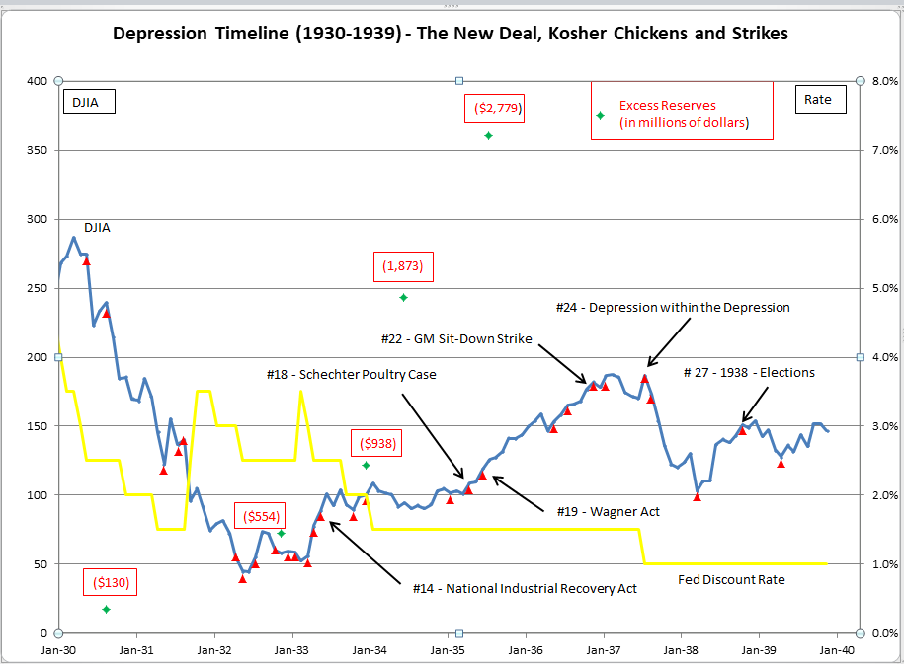Take it From Kosher Chickens, Ben Bernanke Knows Nothing About the Depression
SUMMARY:
- Ben Bernanke believes the Great Depression was caused by passive governments & central banks.
- Bernanke credits FDR for 'experimenting boldly' and this 'outside the box thinking' is what finally ended the Depression.
- Bernanke is wrong about the beneficial role government policy played during the Depression.
- Rather than ending the Depression, government policy was a major reason the Depression lasted as long as it did! This is conclusively demonstrated by the Schechter Poultry Case of May 1935.
DISCUSSION:
In his post-crisis memoir, The Courage to Act, Ben Bernanke discusses his thoughts on the Great Depression. He writes:
"A more general lesson from the Depression is that policymakers confronted with extraordinary circumstances must be prepared to think outside the box, defying orthodoxy if necessary. Franklin Roosevelt, who took office in 1993, exemplified this by experimenting boldly in the face of the intractable slump....These measures brought intense criticism from orthodox economists and conservative business leaders. And they were indeed experiments. But collectively they worked." (1)
FDR initiated a serious of radical economic policies to combat the Depression, what Ben Bernanke describes as 'bold experiments.' The largest and most ambitious of these was the National Industrial Recovery Act (NRA), passed on June 16, 1933, (Item 14 in Figure 1).
FIGURE 1:

The NRA established a nationwide network of codes and standards. These codes and standards where used to essentially corral and direct industry. Huge cartels were created in a wide range of industries, and the cartels were used to control wages, prices and production. As is always the case, the largest companies were most eager to form cartels as cartels guarantee the largest companies remain the largest. However, the smaller more nimble companies - which produce the most new jobs - were placed in a straight-jacket.
A good example of how all encompassing the NRA dictates and controls were can be seen by the NRA "Cleaners and Driers" code. The code required a price of 40-cents to be charged to press a suit. Jacob Maged of Jersey City, New Jersey had the temerity to charge 35-cents and when threatened with jail he said, "If you can send me to jail, go ahead." Soon afterward, Maged was imprisoned and was fined $100 to boot! (2)
As Figure 1 shows, with the NRA passed the economy did not improve in any marked way, see Items 14 and 18. The chart uses the stock market as a proxy for economic activity. (It isn't perfect in this regard but the data is the easiest to obtain and among the least ambiguous data available.) However, as the chart shows, soon after Item 18, the stock market began a rapid ascent, and this was mirrored by the economy overall. So what was Item 18?
Item 18 was the Schechter Poultry case. Schechter Poultry was a case tried before the Supreme Court and and the court unanimously ruled the NRA unconstitutional! In other words, once the NRA - the linchpin of the entire New Deal - was declared unconstitutional, (the NRA gave the federal government powers authorized nowhere in the constitution), the economy roared back to life!
Ben Bernanke's conclusion that government policy played a huge role in finally ending the Depression is completely undermined by Figure 1! At its core, the NRA was government central planning of the economy. FDR - born into prodigious wealth, educated at Harvard and with no experience in private commerce - took little convincing that the national economy would benefit from his micromanaging and fine-tuning. What Bernanke describes as 'boldly experimenting' was nothing more than enacting policies based exclusively on arrogance, hubris and complete ignorance of how commerce works! (Little wonder these policies find such support among academics and central bankers today!)
In particular, because government policy couldn't be predicted in advance, businesses could not make plans for the future. As plans for the future often require borrowing money to make investments to meet some future demand, business loans dried up. Ben Bernanke believes the collapse in the money supply 'caused' the Depression. Instead, the collapse in the money supply was a consequence of the policies that Ben Bernanke believes helped end the Depression!
In next week's article, what brought the recovery spawned by the Schechter Poultry case to a halt will be discussed.
Peter Schmidt
Sugar Land, TX
January 24, 2021
PS - As always, if you like what you read, please register with the site. It just takes an e-mail address and I don't share this e-mail address with anyone. The more people who register with the site, the better case I can make to a publisher to press on with publishing my book. Registering with the site will give you access to the entire Confederacy of Dunces list as well as the financial crisis timeline.
Help spread the word to anyone you know who might be interested in the site or my Twitter account. I can be found on Twitter @The92ers
ENDNOTES
1. Ben Bernanke, The Courage to Act, W.W. Norton, New York, 2015, p. 36
2. Robert P. Murphy, The Politically Incorrect Guide to the Great Depression and the New Deal, Regnery Publishing, Washington, DC p. 131

